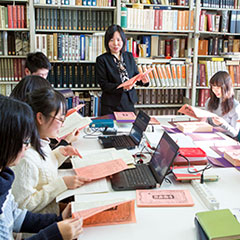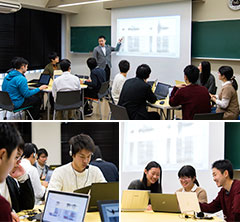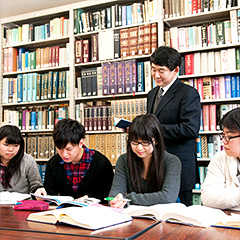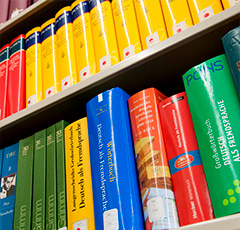Course of
Linguistics and Literature
The Course of Linguistics and Literature will lead you into the world of learning known as linguistics and literature, while pursuing all the meanings of the spoken or written word. Whichever among the six majors of the Course of Linguistics and Literature you choose, you will likely consider the nature of human linguistics and reexamine literary works with fresh insight. This path of study is also a "practical science of the spirit," cultivating a strong but flexible spirit.
Examples of Graduate Thesis Topics
- A Study of the "Tsuchigumo Scroll" ? Considering the placement of lost notes
- The Theory of Longing for "Place" in Lu Xun ? Can the "path" be made or not?
- Semantics of Faries and Dragons
- The Pleasure of Märchen
- The "Impersonal Construction" in French
- Three Uses of duoc/bi in Vietnamese
| [Majors] |
ê Japanese Language and Literature ê Chinese Language and Literature ê English Language and Literature ê German Language and Literature ê French Language and Literature ê Linguistics |
|---|
Japanese Language and Literature
What sort of word is "Japanese" for foreign countries? How do you answer if someone asks, what especially characterizes Japanese literature?
It might occur to one to give a makeshift answer, such as "Japanese has honorific terms" or "Japanese literature has lots of works that finely describe the workings of the heart." But how many of us would come up with such a ready answer? In fact, how well do we actually know Japanese and Japanese literature?
The truth is, even people who are called specialists find it very difficult to give an accurate answer to these questions.
In fact, there is a lot that Japanese do not know about these familiar subjects. And here lie great opportunities to discover something new if we pay attention. It may be that the foreign students studying with us will be able to help in these discoveries.
The greatest feature of this major is how modest discoveries of familiar subjects correct our view of the world.
Teaching Staff

Chinese Language and Literature
From time immemorial, a Chinese character cultural sphere [Remark 5] with China as the messenger was established in East Asia, and today forms the largest linguistic and cultural sphere in the world. In this major, we want you, the students, to be as active as the ever-changing personnel involved in China in international society in dealing with a curriculum such ours.
In the lectures, you will systematically learn about Chinese language, literature, and culture through instruction such as introductory lectures. Your classroom work will, first, arm you with practical skills in the Chinese language through courses with small student numbers taught by foreign faculty. Reading of literature and lectures by the faculty will further cultivate your awareness of literary issues, and in your senior year, you will select a topic of interest on which to write a graduation thesis. With our varied research fields, such as Chinese grammar and dialects, classic literature, and study of folklore, the faculty can aid and guide you in broad range of research. The best graduation theses are published in the "Bulletin of Department of Chinese Linguistics and Chinese Literature, University of Kanazawa."
Recently, interest in Chinese language training has been very high, and 11 students in the last five years have had the opportunity for extended study abroad at government expense in schools with exchange agreements, such as Beijing Normal University. Most students also voluntarily participate in short-term language training in Beijing during their sophomore or junior year. Most years, the program accepts exchange students from China, who eagerly jump into joint Chinese-Japanese classes. This active foreign exchange program is one of the main features of the classes in this major. Certification may be obtained by taking the test for the Chinese Language License at the university, or by applying for a Chinese teacher's certificate.
English Language and Literature
Most people study English through middle and high school, and have had some contact with several English literary works. For an opportunity to deepen the skills you gained in high school and study English more vigorously, come play a part in our English Language or English and American Literature lectures and applications.
This major covers three basic fields: English literature, American literature, and English language.
In "English Literature," you study a number of selected works from the Renaissance period, focusing on Shakespeare, to the Romantic poets and Victorian novelists such as Dickens.
In "American Literature," instead of focusing on some of the famous authors you already know, you are encouraged to reexamine the diverse literature, culture, and history associated with changes in American society from different viewpoints, such as race, class, or gender,
Whether English or American, you will not simply read literary works, but also pay attention to the era in which the authors lived to consider the dynamic interaction between the people and their times.
Although the field of "English Language" will increase your practical skills in reading, writing, and speaking English, another aspect of this field explores the mechanism by which people speak words from the viewpoint of the latest in cognitive science and neural science, and applies this to improving your practical skills in English. This aspect has been greatly advanced by the ideas of young people, and is a field that has especially attracted attention in recent years. We believe that challenging you in the field of English language to explore the mechanism by which people speak words through the ideas of today's youth will be very significant, while at the same time polishing your practical skills in English.
German Language and Literature
There are people who use German in their daily lives. Living in countries such as Germany, Austria, or Switzerland and having their own history, culture, and society, they have lived very interesting lives (for example, besides producing leading figures such as Goethe and Beethoven, Germany is an advanced nation in environment and health, and also produces Porsche and Mercedes-Benz automobiles). Our German Language and Literature major directs attention toward not just German and German literature, but all matters of interest related to the people in this German language sphere.
Needless to say, since the livelihoods of these people were built while using German, strength in German is the foundation for understanding these activities. The instruction in our major will refine your command of German, advancing in stages starting from simple exercises. We will ask you to study to understand academically the people who use German in their daily lives.
Our German language program is unique in Japan for considering communication problems from a broad range of viewpoints, such as gesture, expression, and vocal inflection, and building up grammatical constructs by dealing with the mechanism by which we understand something. The literature program prides itself on its breadth in addressing in a manner that is thorough, yet enjoyable, the diverse background of literature, from religion to customs, food and clothing, and everyday life, when treating texts such as Grimm's Fairy Tales or contemporary literature.
By all means, discover the pleasure of studying with us.
French Language and Literature
"Universities, schooling, photography, movies, the telephone, subways" ? these are all everyday familiar things. Again and again, when asked where these things originated, most people do not know, but in fact, France was the pioneer in all these fields. Even among the words we use everyday, many of our words of European origin come from French. Choosing a major in French language and literature will mean, first, gaining good working skills in French. These will allow you to understand the French world as it appears in many fields (literature, philosophy, music, art, business, politics, and internation cooperation) through careful reading of texts in the original language.
Your basic study will focus on French itself, and on literary works in French. For this purpose, acquiring a certain level of skill in French is indispensible. Although your study in the major will start with steady, step-by-step improvement of your skills in French, focusing on instruction programs to improve your French in the skills of reading, writing, listening, and speaking. Parallel to this, while receiving instructions through lectures and training in French language and literature, you will select a topic of your interest and prepare a graduation thesis that will serve as the culmination of your university studies.
Such studies will direct your attention to the country known as France, and broaden your horizons with the rich culture and sophisticated arts it has bequeathed the world over many years.
Linguistics
Linguistics is an academic field that seeks to explain scientifically from many angles how languages are organized. Although major languages such as Japanese and English, needless to say, are objects of linguistics, we especially urge people who are interested in local dialects or little-known languages of the world to take up the linguistics major.
In our courses you will learn methods for researching many facets of language. For example, in "Phonetics," you practice pronouncing and hearing the sounds used by the languages of the world, and learn how to express these using phonetic symbols. Besides this course, a course called "Morphology" analyzes, for example, conjugational systems, a course called "Syntax" deals with the structure of sentences, and a course called "Semantics" considers the meaning of linguistic expressions. Finally, a course called "Comparative Linguistics" explores the family relationships between languages, and how these have changed historically.
Special instruction is given in two courses: in "Linguistic Fieldwork" you go out into the field to study local dialects, and in "Acoustic Phonetics" you learn techniques for analyzing language sounds using a computer. There are also practical courses in the generally unfamiliar languages, such as Amharic and Icelandic, which aim to deepen your understanding of the diversity of linguistic structures.
Teaching Staff






